[配套K12]2016-2017学年七年级英语下册 Unit 4 How do you make a
七年级下 英语Unit 4-经典教学教辅文档

A recorder, multi-media computer
Teaching procedures
StepⅠ Revision and Lead-in
Greet the class as usual.Talk about the school rules.
3. Point out the lines after the names where students will write the numbers of the rules and then play the recording for a second time.
Play the recording.And then check the answers.
3.Point out the students in the picture and the boxes next to them.
Write these words and expressions on the board and ask the students to repeat them.
classroom
fight
A nation has it’s rule and a family also has one!
Blackboard design
Unit 4 Don’t eat in class
rulearrive late, run, eat, listen to the music, fight
Ms.Don’t arrive late for class.
hallwayDon’t run in the hallways.
Sb: Don’t listen to music in the classrooms or the hallways
【K12学习】新目标七年级英语下册知识点 词汇、听力及语法
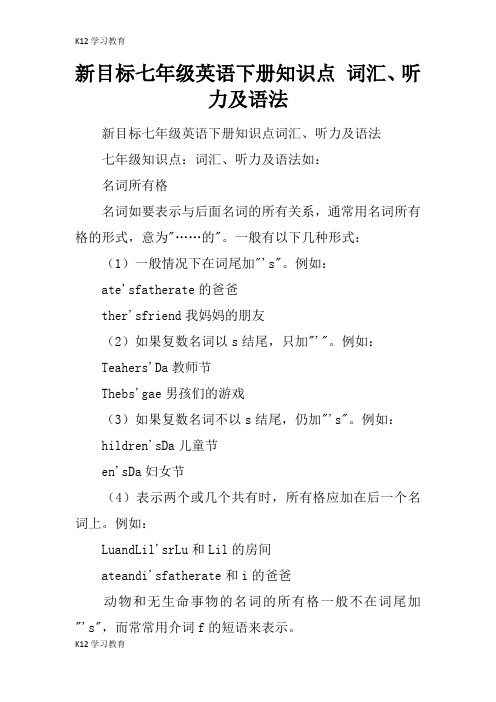
新目标七年级英语下册知识点词汇、听力及语法新目标七年级英语下册知识点词汇、听力及语法七年级知识点:词汇、听力及语法如:名词所有格名词如要表示与后面名词的所有关系,通常用名词所有格的形式,意为"……的"。
一般有以下几种形式:(1)一般情况下在词尾加"'s"。
例如:ate'sfatherate的爸爸ther'sfriend我妈妈的朋友(2)如果复数名词以s结尾,只加"'"。
例如:Teahers'Da教师节Thebs'gae男孩们的游戏(3)如果复数名词不以s结尾,仍加"'s"。
例如:hildren'sDa儿童节en'sDa妇女节(4)表示两个或几个共有时,所有格应加在后一个名词上。
例如:LuandLil'srLu和Lil的房间ateandi'sfatherate和i的爸爸动物和无生命事物的名词的所有格一般不在词尾加"'s",而常常用介词f的短语来表示。
aapfhina一幅中国地图thenaefherat她的猫的名字apitureffail我的家庭的一张照片thedrfthebedr卧室的门2祈使句祈使句主要用来表示说话人的请求、命令、建议、叮嘱等意图。
祈使句一般不用主语,读时用降调。
为使语气委婉、礼貌,常在句首或句尾加please。
在句尾时,please前多用逗号。
(1)祈使句肯定形式的谓语动词一律用动词原形。
Gandsee去看看。
ein,please请进。
(2)祈使句的否定形式常用dn't于句首。
Dn'tlaturbs不要看书。
Dn'tplantherad不要在马路上玩。
3Therebe的句子结构Therebe是一个"存在"句型,表示"有"的意思,肯定句的形式为:Therebe+名词(单数或复数)+地点状语或时间状语。
【配套K12】[学习]七年级英语上册 Unit 1 My name’s Gina练习题 (新版)人教
![【配套K12】[学习]七年级英语上册 Unit 1 My name’s Gina练习题 (新版)人教](https://img.taocdn.com/s3/m/f24c5da983d049649b66588c.png)
Unit 1 My name's Gina Ⅰ.根据句意和首字母提示写出所缺的单词(8分)1.—What's your n________?—My name is Mary.2.I'm Gina. N________ to meet you!3.His name i________ Tony.4.Hello. I a________ Jenny.5.Is h________ name Helen?6.Tom and Tim are good f________.7.His f________ name is Dale.8.The boy in a red jacket is David. His l________ name is Brown.Ⅱ.根据句意和汉语提示写出所缺的单词(6分)1.She is in Class ________(三).2.I am in a middle________(学校).3.________(她) is Alice. Her last name is Green.4.Three and five is ________(八).5.She is from ________(中国).6.This is my ________(朋友) Lisa.Ⅲ.根据汉语意思完成句子(10分)1.她叫什么名字?________ ________ name?2.他的名字是艾伦。
________ ________ is Alan.3.他是迈克吗?________ ________ Mike?4.我的电话号码是3217845。
My ________ ________ is 3217845.5.他姓杨。
________ ________ ________ is Yang.Ⅳ.按要求完成下列各题(10分)1.His name is Jerry. (改为同义句)________ ________ Jerry.2.My sister's name is Amy. (对画线部分提问)________ your sister's ________?3.His telephone number is 5489963. (对画线部分提问)________ ________ telephone number?4.Is she Helen? (作否定回答)________, she ________.5.first, Linda, her, is, name (.) (连词成句)________________________________________________________________________Ⅴ.单项选择(10分)( )1.________ am a boy. ________ name is Wang Lei.A.I; I B.I; MyC.My; I D.My; My( )2.This is Linda. She ________ an English girl.A.is B.am C.are D.be( )3.________ am a girl. ________ name is Helen Green. A.I; I B.I; MyC.My; I D.My; I( )4.—Nice to meet you!—________.A.I'm fineB.Nice to meet you, tooC.Good morningD.Thank you( )5.The boy is Nick King. Nick is his ________.A.first name B.last nameC.family name D.full name( )6.His name is David Beckham. We can call him ________. A.Mr. David B.Mr. BeckhamC.Mrs. David D.Mrs. Beckham( )7.—________ his telephone number?—It's 5684454.A.What B.What'sC.How D.How's( )8.—________ is his first name?—His first name is Jack.A.How B.WhatC.Where D.Who( )9.—Is Lisa your sister?—________. She is my friend.A.Yes, it is B.No, it isn'tC.Yes, she is D.No, she isn't( )10.Her name is Linda ________ she is from Nanjing. A.and B.but C.or D.soⅥ.补全对话,方框中有两个选项多余(10分)A: 1.________B: Good morning!A: I'm John. 2.________B: My name is Mary.A: 3.________B: My last name is Smith. What about you?A: My last name is Brown.B: 4.________A: Nice to meet you, too.B: 5.________A: My telephone number is 5557768.A.What's your name?B.Nice to meet you!C.Good morning!D.What's your last name?E.What's your telephone number?F.What's her first name?G.I'm fine.Ⅶ.阅读理解(15分)( )1.________ is Anna's last name.A.Smith B.MillerC.Brown D.White( )2.Bob is ________ years old.A.6 B.7C.8 D.9( )3.________ are in China.A.Anna and TinaB.Bob and MikeC.Mike and HelenD.Bob and Cindy( )4.62251320 is ________ phone number.A.Cindy's B.Bob'sC.Helen's D.Anna's( )5.There are (有) ________ names of girls in the passage.A.two B.fiveC.four D.threeⅧ.任务型阅读(15分)My name is Frank Smith. I'm nine. I am in Class Three, Grade Four. My phone number is 6755832. I'm from the USA.I'm in Shanghai No. 5 Middle School.根据短文内容完成学生卡。
【配套K12]七年级英语下册 Unit 10 I’d like some noodles Section A(Grammar Focus-3c)课后作业 (新版
![【配套K12]七年级英语下册 Unit 10 I’d like some noodles Section A(Grammar Focus-3c)课后作业 (新版](https://img.taocdn.com/s3/m/8ec3df42de80d4d8d15a4fd6.png)
Unit 10 I’d like some noodles一、根据句意及汉语提示完成单词1.I want a bowl of __________ (面条). I'm hungry.2.Mary wants to buy a sweater for her mother, but she doesn't know the__________ (尺寸).3.We can get __________ (牛肉) and milk from cows.4.China is a __________ (大的) country with a long history.5.There are many kinds of __________ (肉) in the shop, like chicken and mutton.二、根据汉语意思完成课文原句或原句改编6.你想要什么?What ________ you ________?7.牛肉汤里有蔬菜吗?Are there any vegetables in the ________ ________?8.你想要什么种类的面条?________ ________ ________ noodles would you like?9.你想要多大碗的?________ ________ would you like?10.你想要一份大碗的吗?Would you like ________ ________ ________?三、根据句意及汉语提示,填入恰当的词完成句子11.—When can you finish the work?—I'm not sure ________ (还).12.Beef noodles and dumplings are their ____________ (特价品).13.The ________(土豆) look nice.Let's buy some.14.What are their ________(点的菜肴)?15.I ________(愿意) love to drink a cup of tea.四、用所给词的适当形式填空16.I need some________(mutton)to cook dinner.17.There ________ (be) some juice and apples in the fridge (冰箱).18.Jim would like________(have) some beef and carrot noodles.19.—What would you like?—I'd like some____________(cabbage) noodles.20.(N)This machine is ________ (special) designed for blind people.五、用适当的介词填空21.There is nothing ________ the cup. It is empty.22.These kinds ________ clothes are very good and sell well.23.What ________ having some chicken soup. It's very delicious.24.I would like to go to the park ________ my brother after school.25.You can get a special ________ free in this restaurant.六、单项选择26.—What ________ of noodles would he like?—Tomato and egg noodles.A.kind B.size C.color D.fruit27.I like tomato noodles,but my sister likes noodles________ chicken. A.have B.has C.with D.of28.Those ________ doctors would like some ________ noodles.A.woman; tomato B.women; tomatoesC.woman; tomatoes D.women; tomato29.(中考·黄冈)—What ________ bowl of noodles would you like,small, medium or large?—A large bowl of beef noodles, please.A.color B.price C.size D.kind30.—Would you like some ________?—Oh,yes,just a little.A.rice B.carrots C.eggs D.bananas31.—Is there any tea in the cup?—________.A.Yes, it is B.No, it isn'tC.No, there isn't D.No, there aren't32.(2015·哈尔滨)Health is important for us teenagers, so we should eat more vegetables such as ________ to keep healthy.A.tomatoes and potatoesB.tomatos and potatosC.tomatos and potatoes33.—Did you read today's newspaper?—No, I didn't. Is there ________ in it?A.something importantB.anything specialC.new anythingD.good something34.(2015·遵义)A:Can I help you,madam?B:I want ________.A.two boxes of appleB.two glass of waterC.two bowls of porridge35.(2015·德州)—Would you like to come to dinner tomorrow evening?—________A.Yes, it's true. B.You really do.C.It's upstairs. D.Yes,I'd love to.七、语法专练:按要求改写句子36.I'd like mutton noodles.(改为一般疑问句并作肯定回答)________ ________ ________ mutton noodles?Yes,________.37.She'd like a small bowl of soup.(对画线部分提问)________ ________ bowl of soup would ________ like?38.Miss Miller would like potato__and__cabbage noodles.(对画线部分提问)________ ________ ________ noodles ________ Miss Miller________?39.My father wants a large bowl of egg noodles.(改为同义句)My father ________ ________ a large bowl of egg noodles.40.There is some meat in the tomato and egg soup.(改为一般疑问句并作否定回答)________ ________ ________ meat in the tomato and egg soup?No,________isn't.八、根据汉语意思完成句子41.桌子上有一碗羊肉汤。
【配套K12]七年级英语下册 Unit 8 The Seasons and the Weather Topic 1 What’s the weather like in summ
![【配套K12]七年级英语下册 Unit 8 The Seasons and the Weather Topic 1 What’s the weather like in summ](https://img.taocdn.com/s3/m/41f517e16f1aff00bfd51e24.png)
Unit 8 The Season and the WeatherTopic 1Section A【学习目标】学啥我知情加油!1.复习构词法、一般现在时和一般过去时的用法。
2.谈论温度、天气、季节并学写天气预报。
【重点难点】1.学习询问和描述不同季节天气的表达。
2.能听懂谈论季节和天气状况的对话与课文。
3.能用英语询问和描述季节和天气。
【快乐预习】“不打无准备之仗,只有准备充分,方可取得成功。
我相信我是最棒的!”1、结合课后注释,预习对话1a, 完成下面任务,为课堂学习做好准备。
①找出并完成表达询问天气的句子:____________ ? _______________?②找出并完成下列句子:It’s a good season for(fly)kites. It’s a good time (climb)hills 2、标出对话中重要的短语和句型,标出疑难点,准备课堂中讨论解决。
在春天在夏天放风筝去游泳堆雪人爬山好时候学做某事3、预习Section A 2a,完成下列问题①翻译成汉语:Which season do you like best?②词组去年我最喜欢的季节难说【自主学习】专心、细心、留心,成功将会属于我!任务一:快速阅读1a对话内容。
任务二:仔细阅读1a对话内容,完成1c。
任务三:详细朗读2a对话,根据2b的提示,编写一段对话。
【合作学习】1、小组对学:分组大声朗读1a对话,然后分角色朗读并相互检查1b、1c答案。
2、小组互学:相互检查2b所编写的对话。
大声朗读短文,为复述对话做准备。
3、分组讨论:根据1c中所提供的对话示例,讨论如何运用句型“What’s the weather like in ?”和“How is the weather in ?”编写对话,并做好对话表演准备。
【展示交流】挑战一::对话表演机会就掌握在你手中,快将改编好的对话拿到全班面前展示吧。
挑战二:复述对话根据1a对话内容和图片及2b提示内容复述对话。
(人教版)新目标2016-2017学年七年级下英语unit4测试题(有答案)
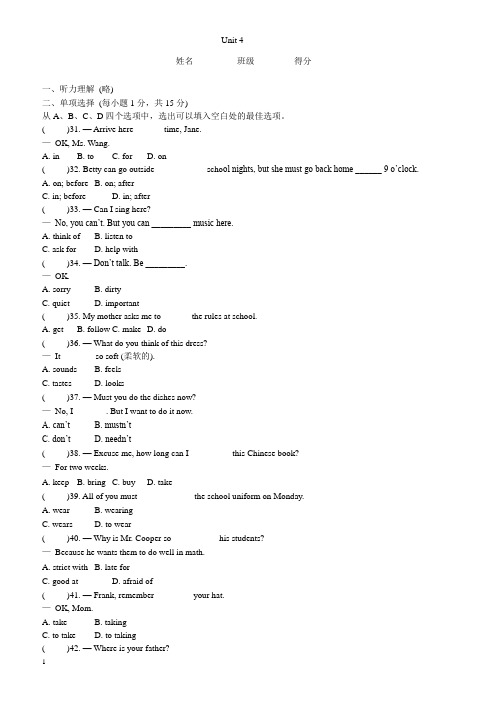
Unit 4姓名________ 班级________ 得分________一、听力理解(略)二、单项选择(每小题1分,共15分)从A、B、C、D四个选项中,选出可以填入空白处的最佳选项。
( )31. — Arrive here ______ time, Jane.—OK, Ms. Wang.A. inB. toC. forD. on( )32. Betty can go outside ___________ scho ol nights, but she must go back home ______ 9 o’clock.A. on; beforeB. on; afterC. in; beforeD. in; after( )33. — Can I sing here?—No, you can’t. But you can _________ music here.A. think ofB. listen toC. ask forD. help with( )34. —Don’t talk. Be _________.—OK.A. sorryB. dirtyC. quietD. important( )35. My mother asks me to ______ the rules at school.A. getB. followC. makeD. do( )36. — What do you think of this dress?—It _______ so soft (柔软的).A. soundsB. feelsC. tastesD. looks( )37. — Must you do the dishes now?—No, I _______. But I want to do it now.A. can’tB. mustn’tC. don’tD. needn’t( )38. — Excuse me, how long can I _________ this Chinese book?—For two weeks.A. keepB. bringC. buyD. take( )39. All of you must ____________ the school uniform on Monday.A. wearB. wearingC. wearsD. to wear( )40. — Why is Mr. Cooper so __________ his students?—Because he wants them to do well in math.A. strict withB. late forC. good atD. afraid of( )41. — Frank, remember ________ your hat.—OK, Mom.A. takeB. takingC. to takeD. to taking( )42. — Where is your father?—Oh, he is cooking (在做饭) in the ___________.A. kitchenB. classroomC. hallwaysD. dining hall( )43. To be a pianist, you need to practice _____ the piano a lot.A. playB. to playC. playingD. to playing( )44. —It’s said (据说) that nice people will (将要) have good _________.—Yeah, but I don’t think it’s always true.A. luckB. hairC. jobD. night( )45. — Can I eat in the classroom?—______. Classroom is a place (地方) to study.A. Yes, you canB. No, you can’tC. Yes, you doD. No, you don’t三、完形填空(每小题1分,共10分)阅读下面信件,从A、B、C、D四个选项中,选出最佳选项。
【K12学习】新目标七年级英语下册unit8-12复习学案
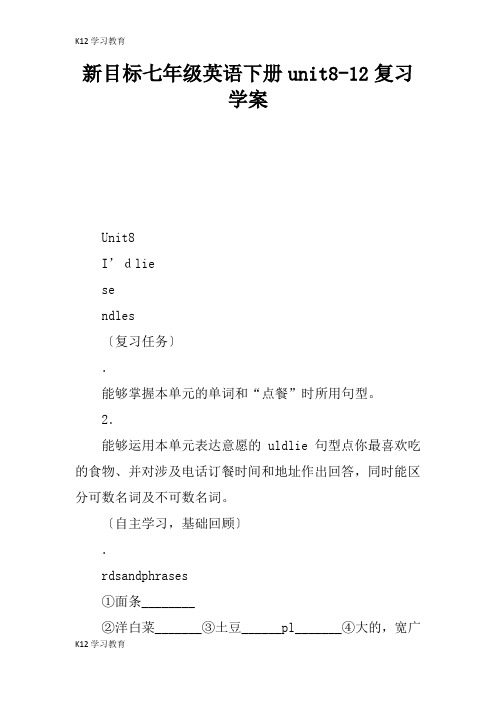
新目标七年级英语下册unit8-12复习学案Unit8I’dliesendles〔复习任务〕.能够掌握本单元的单词和“点餐”时所用句型。
2.能够运用本单元表达意愿的uldlie句型点你最喜欢吃的食物、并对涉及电话订餐时间和地址作出回答,同时能区分可数名词及不可数名词。
〔自主学习,基础回顾〕.rdsandphrases①面条________②洋白菜_______③土豆______pl_______④大的,宽广的______(反)______⑤饺子_______pl_______⑥粥,糊_________⑦果汁________⑧鸡肉________⑨原因________⑩菜单_________1)一碗面条____________12)橘子汁_____________13)绿茶____________14)想要,愿意___________1)饺子屋___________16)甜点屋____________17)一小/中/大碗面条_____________18)牛肉西红柿面_____________________ 2.Sentenesandlanguagepints〈1〉你想要哪种面条?(P471a)_____________________________________________ 此句中ind作名词“种类”如:一种__________各种各样的___________同种类的_______另外,ind还可作形容词“友爱的”,如:她是个可亲的女孩。
______________________________也可作副词“有点儿,稍微”。
如:熊猫有点逗人喜爱。
____________________________________〈2〉我想要牛肉面。
(P482)________________________________________________ 译:牛肉和西红柿面条_____________________加羊肉和土豆的面条__________________〈3〉---他想要多少(多大碗装)的面条?________________________------(P48GraarFus)---他想要一小碗/中号碗/大碗面条。
【配套K12]七年级英语下册 Unit 8 Is there a post office near here Section B(3a-Self Check)课后作业
![【配套K12]七年级英语下册 Unit 8 Is there a post office near here Section B(3a-Self Check)课后作业](https://img.taocdn.com/s3/m/3030f8fd58f5f61fb6366611.png)
Unit 8 Is there a post office near here一、根据句意及汉语提示完成句子1.Don't play soccer on the ________ (公路).It's dangerous.2.We don't need any ________ (钱) for our lunch at school.3.They like to live with us in the village. There's clean ________ (空气) here. 4.(中考•苏州)I'm busy at the moment, but I'll be __________ (空闲的) this afternoon. 5.—Do you __________ (喜欢) your new life in town?—Yes, of course. I like interesting things.二、根据汉语意思完成课文原句或原句改编6.就沿着大桥街走,当你看到图书馆时向左转。
Just ________ ________ Bridge Street and ________ ________ when you see the library.7.我喜欢在那里度过周末时光。
I like to ________ ________ there on weekends.8.我喜欢看猴子们爬来爬去。
I love to watch the monkeys ________ ________.9.生活中最美好的东西是免费的。
The best things ________ ________ are ________.10.你可以很容易地到达图书馆。
You can ________ ________ the library ________.三、从方框中选择适当的单词,并用其适当形式填空11.12.(N)——Once a week.13.—Look! What's that?—It's a tortoise (龟). It's ________ slowly on the road.14.There is a supermarket on the ________ side of the street.15.I'd like ________ time with my grandparents on vacation.四、用所给词的适当形式填空16.Turn left at the second ________ (cross) and the bookstore is on your right.17.There are a lot of flowers in my____________(neighbor).18.I usually spend my money________(buy) interesting books.19.(2015•武威)The ________ (monkey) are trained to do a lot of things like humans.20.(2015•酒泉)Don't be nervous. Try your best and you'll pass the exam________(easy).五、根据句意及首字母提示完成句子21.I o________ go to the park on Sunday, but sometimes on Saturday.22.In China, people should walk on the r________.23.Do you know the old saying that all the r________ lead to Rome?24.On summer holiday, I like to drive a________ the river and see the beautifulsights.25.There are five o________ and twenty classrooms in the building.六、单项选择26.—Who's the boy ________ your left in the photo, Cindy?—He's my epal (网友).A.for B.in C.on D.with27.Because there's no bridge ________ the river, the villagers have to take a boat to the other side.A.in B.along C.across D.before28.(中考•孝感)My old neighbor Charles enjoys ________ photos. He always goes out with his camera.A.take B.to take C.taking D.took29.—________ can I get to the post office?—Walk along the street and it's behind the City Hospital.A.When B.Where C.Why D.How30.People can turn left when they see the sign______.A B C D31.(中考•广安)—I ________ a lot of time playing computer games every day.—Oh, boy. It's bad for your eyes.A.spend B.take C.pay32.I walk ________ in the town after supper every day. So I know every small shop there.A.around B.into C.across D.through33.—Where's Linda?—She is watching her mother ________ dinner in the kitchen.A.cook B.cooksC.cooking D.is cooking34.(中考•成都改编)Mum wants to watch the CCTV news. Let's ________ the TV.A.turn left B.turn on C.turn off35.________ China Dream come true, all the Chinese people must work hard together.A.Make B.MakingC.To make D.Made七、根据汉语完成句子,每空一词36.沿南街一直往前走,然后向左拐,银行就在你的右边。
【配套K12]七年级英语上册 Unit 4 Having Fun句式精讲精练 (新版)仁爱版
![【配套K12]七年级英语上册 Unit 4 Having Fun句式精讲精练 (新版)仁爱版](https://img.taocdn.com/s3/m/97064e4c844769eae109ed13.png)
Unit 4 Having Fun句式精讲精练句式精讲1. What can I do for you?What can I do for you? 是商店售货员在招呼顾客的时候经常用的交际用语,用来很礼貌的招呼顾客。
不能用“What do you want to buy?或What do you want? ”,这样的句型是中国式的表达。
此时,顾客如果想买东西就会说:Yes, please. I would like to+要买的商品。
是的,我想买……如果顾客不想买商品,就会说:No, thanks. I just have a look.或No, thanks. I am just looking around.不,谢谢。
我只是随便看看。
2. How much is it?(1)How much + 不可数名词 + 一般疑问句?是用来询问东西(不可数名词)的多少。
例如:How much rice is there in the bag? 袋子里有多少米?(2)How many + 可数名词 + 一般疑问句?是用来询问东西(可数名词)的多少。
例如: How many desks are there in the classroom? 教室里有多少课桌?3. We’ll take it.We’ll是We will的缩写,take 动词,此处表示“买”,相当于“buy, get, have”。
在英语国家,购物的时候,经过一番挑选后决定购买某种商品时,要用“I /We will take it / them.”而不用“I/We will buy it / them.”例如:-How much is this watch? 这块表多少钱?-Seven dollars. 7美元。
-Oh, it’s cheap. I’ll take it. 哦,很便宜。
我买了。
4. Jane, what do you think of this yellow skirt?(1)What do/does sb. think of…?这是询问某人对某事(人)的看法常用的句型,意为“……认为……怎么样?”,答语往往是对某物(人)的评价。
【配套K12】[学习]2018秋期七年级英语下册 Unit 4 Seasons and Weathe
![【配套K12】[学习]2018秋期七年级英语下册 Unit 4 Seasons and Weathe](https://img.taocdn.com/s3/m/530ab602453610661ed9f450.png)
Unit 4 Seasons And WeatherLesson 12 Summer Holiday本课是北师大版《初中英语》七年级下册教材第四单元Unit 4 seasons and weather ,话题为季节、天气情况、天气预报、旅行。
其中Lesson 12 Summer Holiday是围绕旅行这一话题展开的。
第一课时通过阅读,获取David及其家人的假日旅行信息,同时了解一些国内旅游胜地名称。
第二课时通过感知课文中的be going to 句型,归纳总结be going to 的语意功能,并完成肯定句、否定句、一般疑问句及特殊疑问句的学习。
最后,能用所学句型结构简单描述自己的假期安排。
【知识与能力目标】1. Key vocabulary2. Key structures:【过程与方法目标】1. To understand conversations about the summer holiday.2. To talk with the partners about the summer holiday.【情感态度价值观目标】通过阅读,获取有关David 及其家人有关暑期计划安排的旅行信息【教学重点】1.获取有关David及其家人有关暑期计划安排的旅行信息;2.体会be going to 的表意功能。
【教学难点】简单讲述David及其家人的暑期计划安排。
Tape recorder, MultimediaStep 1. BrainstormQ: summer holiday is coming. How do you want to spend your holiday? Show them the pictures to review and teach some phrases.Step 2. Warm-upQ: If you go on a tour, where do you want to go?Show them some pictures of the Great Wall, the Palace Museum etc. Some pictures to help the students focus on the key words in this lesson and the key points of the lesson.Step 3. Pre-reading1.Introduce the postcard, and give them the questions. And then playthe tape for them.2.Go over the questions and listen to the tape to get the answers.Check the answers.Step 4. Reading1.1st reading:Direct the students to the dates and the photos.2.2nd reading:Direct the students to the True and False questions.3.3rd reading:Show them the tables and explain how to do them.Play the tape.Have them into groups of 4 or 5.Solve their problems.Step 5. Read and fill in the table.1. Read the text again and complete the table in group.2. Show their ideas with others.3. Read the text and find out any questions to ask for helpStep 6 Find out the following phrases in the text.在夏令营中从七月24号到27号照相照许多照片给……照照片因……而著名我们旅行中的最后一站在……花费许多时间在大海里游泳带某人去…….将举行……Step7 Talk about David’s summer holiday.Work in pairs.Act it out.Step 8 HomeworkListen and read the text.Read and copy the phrases.Try to write a short passage to talk about David’s summer holiday.略。
【配套K12】牛津英语StarterU4全英文教案
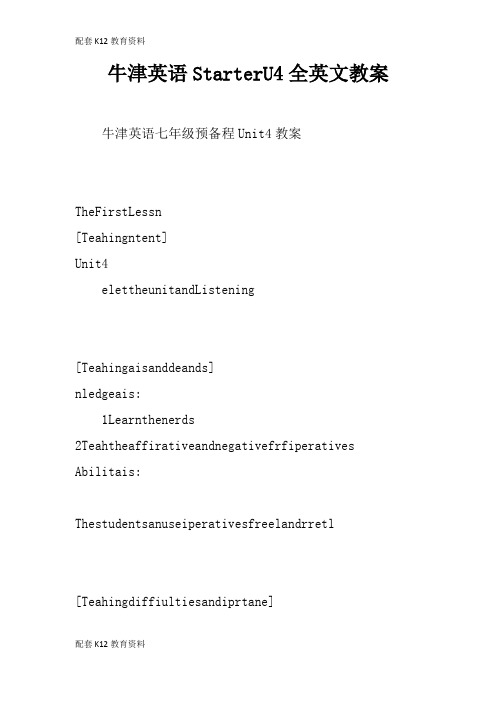
牛津英语StarterU4全英文教案牛津英语七年级预备程Unit4教案TheFirstLessn[Teahingntent]Unit4elettheunitandListening[Teahingaisanddeands]nledgeais:1Learnthenerds2Teahtheaffirativeandnegativefrfiperatives Abilitais:Thestudentsanuseiperativesfreelandrretl [Teahingdiffiultiesandiprtane]1Thespellingfserds,suhas,blabard,again,fifteen,thir teen,behind,nuberandtent2Thespellingftheteaher’sdesTherulefthenubersith‘-teen’and‘-t’3theaffirativeandnegativefrfiperativesandpluralfrfn un[Teahingtls]PretrandStudents’b,rb[Teahingpredure]Pre-teahing1Teahthenerds Asthestudentstreadutthenerdsbefretaughtnestudentrea dsfiverds,sthattheteaheranrrettheiristaesinphnetis 2Asfrthespellingfthenerds,thereareseinhihstudentsal ashavediffiult,suhas,blabard,again,fifteen,thirteen ,behind,nuberandtent3DardgaeAsSstsrtallfthenerdsintthreetpes:nubers,ati ns,andtheequipentinalassrStep1PresentatinHaveaasualhatithstudents,asingabutthelassr: hereareun?Isurlassrabignerasallne?hatanuseeinurlassr?hatelseanufindinurlassr?Hanindsarethereinurlassr?Hanblabardsarethereinurlassr? SthattheteaheranleadtthesubetfthisunitStep2elettheunit1Asthestudentstreadthedialguesfthispartfirst,andsee iftheanreaditrretl2Letstudentsbservethelatinf“please”,andasthehatthsesenteneseaniftaen“please”aaAndasthehtaenegativefrfiperatives3Teahstudentshataniperativeis祈使句就是表示命令或请求的句子。
人教版七年级下学期英语unit4Howdo you get to school

基础知识练习1. 翻译下列短语,并熟练掌握1)到达_____________________ 2)乘地铁________________________________ 3)乘火车_____________________ 4)乘小汽车____________________________ 5)步行去------___________________ 6)骑自行车_____________________________ 7)多远_________________ 8)多久_________________9)多久一次______________ 10)动身去------_________________11)火车站________________________ 12)早班车________________________13)从------到____________________ 14)匆忙吃早餐_____________________15) 全世界 _________________ 16)在北美 _________________17) 交通方式_________________ 18)一小部分,少数的________________19)在周末 __________________ 20)生病住院_________________________21)不要担心 _______________ 22)公共气车之行______二、词汇(根据句意及首字母提示完成单词,或用所给单词的适当形式填空)1. Another word for “ bike ” is b__________.2. There are 60 m__________ in an hour.3. My home isn’t far from here, it’s about two k__________.4. A sheep has four ________ ( foot ).5. It took them ten minutes __________ ( walk ) to the hotel yesterday.6. Different __________ ( country ) has different weather.7. In our school, most __________ ( 学生) take cars to school.8. Lily usually gets up at six, exercises and __________ ( have ) breakfast in the morning.9. It’s over three __________ ( hour ) ride from Shijiazhuang to Beijing.10. When it __________ ( rain ), I take a taxi.检测题一.单项选择1._________ does it _________ you to walk from your home?A.How far;takeB.How long;takeC.How far;spendD.How long;spend2.You ____________ finish your homework on time.A.has toB.mustC.have toD.had to3.He usually _________ home very late.A.reachB.mustC.getsD.arrived in 4.----How far is it from here to the Children Park?-----It’s about _____________.A.30 minutes walkB.30 minutes’s walkC.30 Minutes’ walkD.30-minutes walk5.How about going there ____________ bike?A. inB.aboutC.atD.by6.What do you think ___________ this kind of new computer game?A.ofB.aboutC.forD.over7.____________ is it from here to the bus station?A.How farB.How longC.How oftenD.How soon8._________ do they get to school,by bike or on foot?A.How farB.How longC.How oftenD.How9.In South Korea,most students get to school __________.A.take a subwayB.take the subwayC.by the subwayD.by subway10.I don’t like this hat.Please sho w me ________ one.A.otherB.the otherC.anotherD.any other11.I usually go to school ________ bike,but sometimes I go to school _______ foot.A.with;onB.on;byC.on;withD.by;on12.----Must I do it at once? ----No,you ____________.A.you can’tB.mustn’tC.needn’tD.haven’to13.Going to the museum by subway must be more fun than ________ a bus.A.takeB.takesC.to takeD.taking14.__________ Fridays,I usually play computer games with Zhang Hua.A.InB.AtC.OnD.Before15.We don’t have much money but we enjoy ____________.A.oursB.yoursC.yourselvesD.ourselves三、阅读理解When you are in England,you must be very careful in the streets because the traffic drives on the left.Before you cross(穿过) a street,you must look to the right first and then left.In the morning and in the evening when people go to or come from work,the streets are very busy.Traffic is the most dangerous then.When you drive a car in England,you have to be careful,too.Always remember the traffic drives on the left.So you must be careful.Have a look,or you will go ghe wrong way.In many English cities,there are big buses with two floors.You can sit on the second floor.From there,you can see the city very well.It’s very interesting.( )1. In England the traffic must go _________.A.on the leftB.quicklyC.on the rightD.in the middle( )2. When you cross the street,you must look to ________.A.rightB.the front and backC.leftD.the right first,then left( )3.Traffic is the most dangerous in the morning and evening because ______.A.people are doing some shoppingB.people are waiting for a busC.people go to or come from workD.some people go on the wrong way( )4. It’s very interesting to sit ___________.A.on a busB.on a two-floor busC.on the second floor of two-floor busesD.on the first of two-floor buses( )5. In China,people drive ___________.A.on the leftB.quicklyC.on the rightD.in the middle四、任务阅读(3)Many scientists find that colors can change people’s feelings.It’s very interesting.Some colors can make people feel relaxed,and come colors can make people feel nervous.Now,this kind of knowledge is being used in many places.For example,school walls are always painted green because green makes students feel relaxed.It is also good for the students’ eyes.Some books are also green or light bule for the same reason.(4)Restaurant owners not only have to know how to make food,but also have to know how to make money.Here are some things they’ve learned from scientific studies.The color red makes people hungry.Many fast food restaurants have red furniture(家具) or walls.Soft colors like pink and light bule make people feel relaxed,so they spend more time eating.Loud music may be nice at first,but it soon makes people want to leave..Hard seats also make customers want to eat quickly and leave.Many restaurants,especially fast food restaurants,use this knowledge to make customers eat faster.任务一:根据短文内容回答问题。
[配套K12]2017秋七年级英语下册 Unit 4 Finding your way CW教案 (
![[配套K12]2017秋七年级英语下册 Unit 4 Finding your way CW教案 (](https://img.taocdn.com/s3/m/7149240af111f18582d05a28.png)
1. To introduce the topic of places and transport.
2. To talk about visits and means of transport using model sentences.
Teaching aids:tape recorder
Teaching procedures:
Ⅰ. Warm-up (presentation)
Ask the students on duty to give us a short report about theSunshineTown.
Ⅱ. Listening
1. Listen to the tape, answer my question,“Did Hobo, in fact, know the way?”Help the Ss to answer.
2. go up and down
e.g. Let’s go down the hill together.
3. Don’t be afraid.
e.g.
(2) Don’t play in the street. It’s too dangerous.
(3) I’m afraid that I can’t go with you. I have a lot of work to do.
Ⅳ. Concluition
Introduce the topic of place and transport.
Discussion (task)
Talk about visits and means of transport using the model sentence
[配套K12]2016-2017学年七年级英语下册 Unit 4 Finding your way
![[配套K12]2016-2017学年七年级英语下册 Unit 4 Finding your way](https://img.taocdn.com/s3/m/26c9e4e7a58da0116d174926.png)
Finding your way教学目标:1.To recognize key expressions about directions and tell the different prepositions from one to another.2.To develop intensive listening skills by following instructions and makinga route and develop students’ ability to catch th e detailed information.3.To give directions in an everyday context and write a short passage with these expressions.教学重点:1.To tell the prepositions about directions from one to another2.To use these expressions to write a passage教学过程:Step 2: PresentationRecognize some simple instructions (A1)a. Say : Do you know the meaning of this sentence ? What should you do? Which picture will you choose? Where is the sentence? Maybe it is like this: Cross the bridge and turn rightb. Check their answer and point out: there is another expression in the second picture.Turn right at the second turning.1.The Class 1 Grade 7 students and the exchange students from Britain are going to play a game called “Treasure Hunt”. There’s some treasure somewhere in th e fields. Let’s try to find it. Mr Wu will give us some instructions.a. First listen to the tape and put the instructions into the correct order. (A1)walk past the wooden housealong a small path next to the riverwalk across the fieldwalk towards the bridgewalk straight ontake the second turning on the leftYou are inviting a classmate to your home. You need to give him directions . Use these phrases and the following dialogue as a model. (B)Step 3: Language points1.在第二个拐弯处向右拐,然后一直向前走。
最新人教版七年级英语下册Unit4+练习册答案名师优秀教案
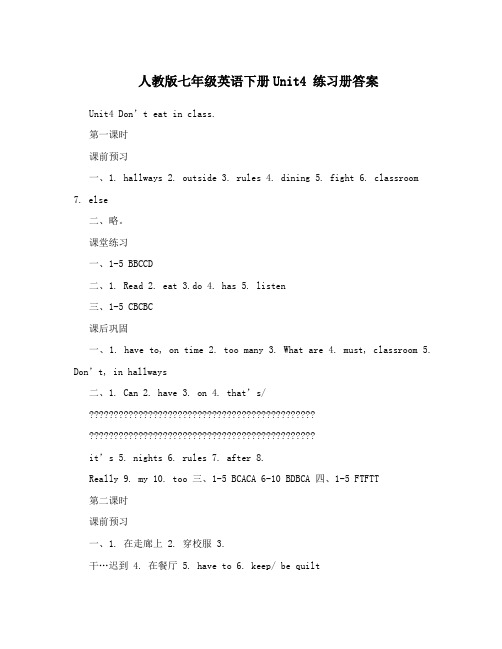
人教版七年级英语下册Unit4 练习册答案Unit4 Don’t eat in class.第一课时课前预习一、1. hallways 2. outside 3. rules 4. dining 5. fight 6. classroom7. else二、略。
课堂练习一、1-5 BBCCD二、1. Read 2. eat 3.do 4. has 5. listen三、1-5 CBCBC课后巩固一、1. have to, on time 2. too many 3. What are 4. must, classroom 5. Don’t, in hallways二、1. Can 2. have 3. on 4. that’s/????????????????????????????????????????????????????????????????????????????????????????????it’s 5. nights 6. rules 7. after 8.Really 9. my 10. too 三、1-5 BCACA 6-10 BDBCA 四、1-5 FTFTT第二课时课前预习一、1. 在走廊上 2. 穿校服 3.干…迟到 4. 在餐厅 5. have to 6. keep/ be quilt二、1. Can 2. Don’t 3. have to 4. can’t 5. Do课堂练习一、1-5 BADBA二、1. don’t have to 2. Don’t 3.Who did, go 4. Don’t arrive 5. have to课后巩固????????????????????????????????????????????????????????????????????????????????????????????一、1-5 ABCAD 6-10 DABDD 二、1-5 FFTTF三、略。
推荐K12学习2017年春七年级英语下册Module4Unit2Everyfamilywillhav
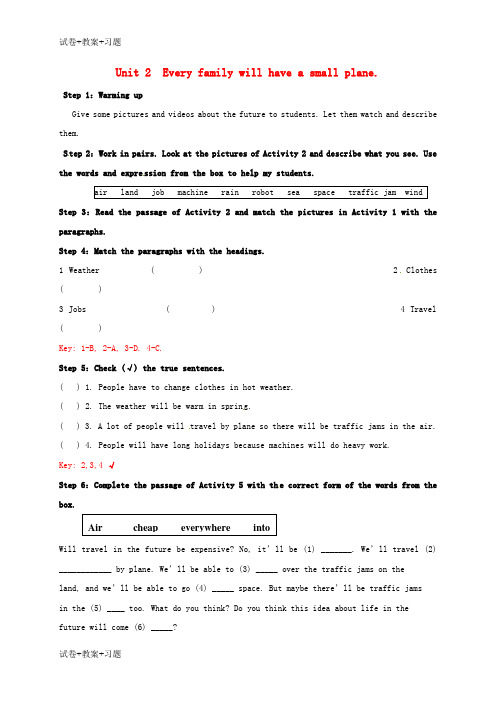
Unit 2 Every family will have a small plane.Step 1:Warming upGive some pictures and videos about the future to students. Let them watch and describethem.S tep 2:Work in pairs. Look at the pictures of Activity 2 and describe what you see. Usethe words and expre ssion from the box to help my students.Step 3:Read the passage of Activity 2 and match the pictures in Activity 1 with the paragraphs.Step 4:Match the paragraphs with the headings.1 Weather ( )2 Clothes ( )3 Jobs ( )4 Travel ( )Key: 1-B, 2-A, 3-D. 4-C.Step 5:Check (√) th e true sentences.( ) 1. People have to change clothes in hot weather.( ) 2. The weather will be warm in sprin g.( ) 3. A lot of people will travel by plane so there will be traffic jams in the air.( ) 4. People will have long holidays because machines will do heavy work.Key: 2,3,4 √Step 6:Complete the passage of Activity 5 with th e correct form of the words from thebox.Will travel in the future be expensive? No, it’ll be (1) _______. We’ll travel (2)____________ by plane. We’ll be able to (3) _____ over the traffic jams on theland, and we’ll be able to go (4) _____ space. But maybe there’ll be traffic jamsin the (5) ____ too. What do you think? Do you think this idea about life in thefuture will come (6) _____?Key: 1. cheap 2. everywhere 3. rise 4. into 5. air 6. trueStep 7:Match the words with their opposites. Use the passage in Activity 2 to help my students.Step 8about life in the future.—I think everyone will have a small plane so travelling will be easy.—Step 9:Make some sentences according to these sentences.Working hours will be short. People will have long holidays.Working hours will be short so people will have long holidays.1. Everyone will have a plane so...____________________________________2. The weather will get hot so...___________________________________3. Machines and robots will do the heavy and difficult jobs so..._____________________________________Step 10: Study the new words and expressions of Unit 1 Module 10.air, land, rain, robot, sea, space, traffic, jam, traffic jam, true, come true, bike(= bicycle), car, into, wind, hour, rise, short, long, light, heavy, here is / are... cheap, not only ...but also..., easy, working, as well, everywhereStep 11:Explain and study the important and difficult points.1. short ~ tall short ~ long2. heave ~ light3. cheap ~ expensive / dear4. here is / are ...5. not only ... but also ...6. the usage of expression “as well”.Step 12:Study Grammar ——Th e simple future tenseThere will not be a computer on every desk in the future.= There won’t be a computer on every desk in the future.It will not be tomorrow. = It won’t be tomorrow.Will it be tomorrow? Yes, it will. / No, it won’t.We will not g o to school by bus. = We won’t go to school by bus. Will we go to school by bus tomorrow? Yes, we will. / No, we won’t. Step 13:HomeworkReview and recite the important points of Unit 2.。
配套K122018秋期七年级英语下册 Unit 4 Seasons and Weather Less

Unit 4 Seasons And WeatherLesson 10 Weather in Beijing本单元谈论季节和天气,本课整体复习并扩展小学英语涉及的关于季节、天气、月份及服装词汇以及谈论天气的功能用语。
学生围绕天气的话题,谈论各种不同的假日活动。
本课通过听、读等活动进一步辨识并规范辅音字母sh, ch 等的发音,以及辨识音标[ʃ],[t ʃ]。
【知识与能力目标】1. Key vocabulary2. Key structures:【过程与方法目标】1. To understand conversations about the seasons and weather..2. To talk with the partners about the seasons and weather..【情感态度价值观目标】Learn to talk with others.【教学重点】学生能够归纳出四季和12个月份的名词,并能正确拼写表示天气的形容词。
【教学难点】学生通过阅读,进一步了解北京的天气,并能够正确查找信息,完成表格。
Tape recorder, MultimediaStep 1. BrainstormShow some pictures to help the students focus on the key words in this lesson and the key points of the lesson.Step 2. Warm-up1.Get the students in pairs and show the example to the students. Help them to talk about the weather in four seasons in Beijing and the activities in each season.2.Example: We have four seasons in Beijing. So we can do lots of different things. It’s ... in summer. We can...3. Help the students show their ideas in front of the class. Say out some expressions. Step 3. Match1.Ask Ss if they know the symbols and ask them to match.Match the seasons and the months.2.Check the answers.Step 4. Read and match1. Show the 4 pictures and help the students read about the weather in Beijing quickly of Ex. 3, P42.2. Check their answers together.3. Help them read the text again and complete the table of Ex. 4, P43.4. Check the key words in groups.5. Try to add more information about clothes in groups.6. Play the tape and help the students read the text correctly.Step 5. Read and complete the table.1. Read the text again and complete the table in group.2. Try to give more words about the clothes in each season in Beijing.3. Show their ideas with others.4. Read the text and find out any questions to ask for helpStep 6 Listen to the tape and repeat1. Read the passage in pairs2. Act it out.Step 8 Answer the questions1. When is winter?2. What’s the weather like in winter?3. What do you wear in winter?4. Where can you go?What can you do in winter?Step9 Describe the form1. Show some pictures about Melbourne to interest the students and prepare for the topic they will talk about.2. Help the students to understand the text about Melbourne and have a talk about weather and months in Melbourne.Step 10 PronunciationListen and follow the lines. Write the correct numbers on the circles.Step 11 Homework1. Write the passage about your favourite seasons on the notebook.2. Recite the words about weather, months, seasons and clothes.3. Listen and read the text for 3 times.略。
七年级英语下册 Unit 4 After-School Activities Lesson 22

2017春七年级英语下册Unit 4 After-School ActivitiesLesson 22Big Plans forthe Weekend教案(新版)冀教版编辑整理:尊敬的读者朋友们:这里是精品文档编辑中心,本文档内容是由我和我的同事精心编辑整理后发布的,发布之前我们对文中内容进行仔细校对,但是难免会有疏漏的地方,但是任然希望(2017春七年级英语下册Unit 4 After-School Activities Lesson 22 Big Plans for the Weekend教案(新版)冀教版)的内容能够给您的工作和学习带来便利。
同时也真诚的希望收到您的建议和反馈,这将是我们进步的源泉,前进的动力。
本文可编辑可修改,如果觉得对您有帮助请收藏以便随时查阅,最后祝您生活愉快业绩进步,以下为2017春七年级英语下册Unit 4After-School ActivitiesLesson 22 Big P lans forthe Weekend教案(新版)冀教版的全部内容。
Unit 4练习答案:Ⅰ. 1。
hurry 2.hurried3。
cooking 4。
surf the Internet5.Actually 6. SomewhereⅡ. 1. something new2。
help;with3. does; housework4。
in a hurry以上就是本文的全部内容,可以编辑修改。
高尔基说过:“书是人类进步的阶梯。
”我希望各位朋友能借助这个阶梯不断进步。
物质生活极大丰富,科学技术飞速发展,这一切逐渐改变了人们的学习和休闲的方式。
很多人已经不再如饥似渴地追逐一篇文档了,但只要你依然有着这样一份小小的坚持,你就会不断成长进步,当纷繁复杂的世界牵引着我们疲于向外追逐的时候,阅读一文或者做一道题却让我们静下心来,回归自我。
用学习来激活我们的想象力和思维,建立我们的信仰,从而保有我们纯粹的精神世界,抵御外部世界的袭扰。
- 1、下载文档前请自行甄别文档内容的完整性,平台不提供额外的编辑、内容补充、找答案等附加服务。
- 2、"仅部分预览"的文档,不可在线预览部分如存在完整性等问题,可反馈申请退款(可完整预览的文档不适用该条件!)。
- 3、如文档侵犯您的权益,请联系客服反馈,我们会尽快为您处理(人工客服工作时间:9:00-18:30)。
反思
教学成败得失及改进设想:
Ⅷ. Role-play
1. Read the conversations and fill in the chart below.
one
cabbage
one
three
four
five
some
Homework:
可以用下列表示过程的词汇来让你描述更加清晰明了。
first, next, then,…finally…
3. Point out the actions in the picture and the list of actions in activity 1b .
Play the recording and check the answers. Ask students to recite the conversation at once.
Ⅵ. Listening
Work on 2b:
1. Let Ss read the chart below. Tell Ss that they should write the ingredient under the correct amount in the chart.
2. Play the recording for the Ss to write the correct answers in the chart.
Unit4
教
学
目
标
知识目标
能掌握以下单词:honey, watermelon, spoon, pot, add, finally, salt
能力目标
能掌握以下句型:─How much yogurt do we need?
─We need one cup of yogurt.
情感目标
通过食物制作过程的介绍,让学生认识到劳动成果的来之不
易,使之懂得不能浪费食物,珍惜他人的劳动成果。
教学重点
动词词组;描述过程的顺序词。
教学难点
能恰当地使用祈使句表达食物的制作过程。
主要教法
Teaching, Speaking & Listening
教学媒体
Recorder & Screen
教 学 过 程
I. Warming up
T:What’s your favorite drink?
peel the bananas, cut up the bananas, put the bananas and the , milk in the blender, pour the milk in the blender, Turn on the blender; drink the milk shake.
S: Cola/ milk/ juice/ tea/milk shake…
II. Lead-in
1. Do1a. Ask Ss to write the names of the actions. Choose the correct words. Ask Ss to fill in the blanks on their own. Then check the answers.
2. Teach the names of all items. Point to the pictures of the items and ask students to repeat.
Focus on the pictures. Ask the students to tell what they see in the picture. Describe each action and ask students to repeat the following:
Ⅲ. Listening
1b Listions in order.
Ⅳ. Game
Let Ss try their best to say how to make a banana milk shake.
Ⅴ. Pair work
Let some pairs ask and answer about the chart.
3. Play the recording again to check the answers.
Ⅶ. Pair work
Ss work in pairs. Try to ask and answer about how to make fruit salad.
4. Ask some pairs to act out their conversations.
